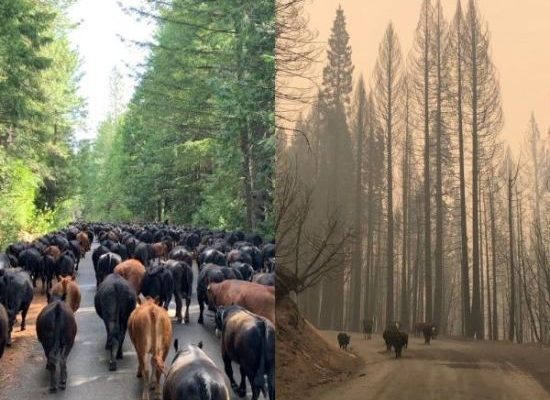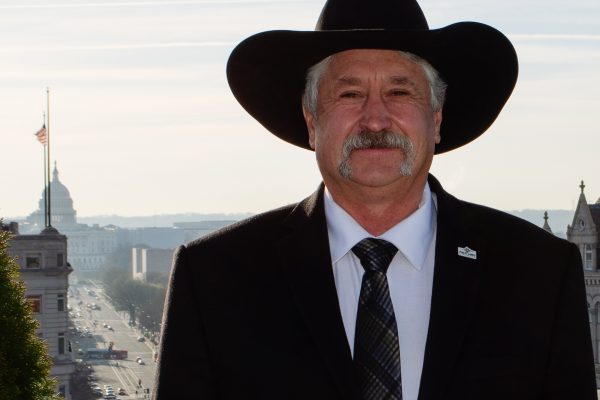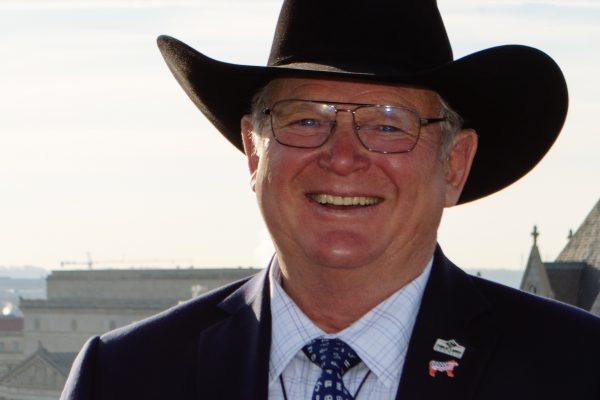By Theodora Dowling
Special to Western Livestock Journal, October 6, 2014
Who were the pioneers? People who forged into new territory and used their labor, water and the soil to create a life for themselves and those who followed. If it hadn’t been for their ingenuity and determination, we wouldn’t have a home here in the United States.
“They are the ones to admire,” says Brice Lee, the immediate past President of Public Lands Council. “They’re the people who came into this country and made it. We’re all a bunch of wimps next to them!” Lee runs cattle on an operation that straddles the Colorado-New Mexico border.
“My mother’s family emigrated from Sweden and settled in Montrose,” said Lee. Montrose is about 120 miles north of Hesperus, where Brice is now. “What they did to put together a ranch—it was tough,” Lee said. “And my folks, they started ranching during the Depression. It wasn’t easy.”
Lee was born in 1935. He worked on the family ranch until he went to college at Colorado A&M (now Colorado State University). He earned his bachelor’s degree in Agronomy & Soil and Water Conservation. He met his late wife, Phyllis, while at college. They married in 1955 and in 1964 started building their operation from two Hereford heifers from the old Colorado State University herd. That line of breeding is still the base of their herd. Their daughter, Lisa, carries on the family tradition of cattle production and agricultural leadership and education. She now raises purebred Red Angus and is an extension beef specialist for North Dakota State University.
Lee speaks proudly of his daughter and his wife Phyllis. Phyllis came to almost every meeting with Brice. She had a loving, steadying presence and we’ve missed her dearly since she passed away in 2013. Phyllis was a moving force behind their family’s philosophy.
“As we’ve gone along, we’ve always tried to make things a little better,” Lee said of their family’s outlook. “You’ve got to stay positive, and take one step forward at a time… You’ve got to contribute something.”
Brice and Phyllis built their operation from scratch, and both held jobs off the place to make it work. Phyllis was an extension agent for La Plata County and the Ute Tribe for 44 years. Brice worked for the Soil Conservation Service as a soil scientist, was a feed salesman, and later bought an elevator and feed mill business. This helped them get their ranching operation off the ground “We operated for many years on leased land and had a base piece of property we owned. You don’t start out just being in the ranching business—we had to do a lot of jobs, and had a lot of stumbles along the way.”
Lee made the point that unless your operation is economically viable, it’s not going to be environmentally viable, either.
“A poor operation is not going to have good environmental effects. This negative picture of ranchers, where they just go in and grub the country out and leave it, well you can’t do that. You’ll go out of business. We’ve tried to leave behind us something that’s a little better for the next ones to come along.”
That philosophy spills over into other areas of Lee’s life. For example, he was part of PLC’s securing of a multimillion dollar trust several years ago. The Public Lands Endowment Trust will now provide funding for projects that promote, enhance and protect grazing on public lands—for many decades to come.
“That was a major accomplishment. I was privileged to be involved in that. It was one of those opportunities that you had to seize and not let slip through your fingers. And we did. I think we made the best of it.”
Lee described the “turning point” when he first decided to jump into association leadership.
“It was around the time of a scabies outbreak in New Mexico. There was an overkill quarantine being forced on us that was getting a lot of us ranchers on the southern Colorado border up in arms. I realized those guys up north weren’t necessarily going to speak up for us—sometimes you’ve got to speak up for yourself. So I decided to get involved.”
And get involved, he did.
Lee served as president of the La Plata County Cattlemen’s Association and the Colorado Cattlemen’s Association (CCA). He has been on the CCA Board of Directors for 16 years. He chaired the National Cattlemen’s Beef Association’s Environmental/ Private Property Committee in the late ’90s. He served six years as an officer of the PLC.
Lee’s leadership has reached beyond the livestock associations. He served nine years as a gubernatorial appointee on the Colorado Water Quality Control Commission; has been chairman of La Plata Water Conservancy District for 10 years; was president of La Plata County Fair Board; and was a longtime 4-H leader.
Influencing young people has been an important part of Brice and Phyllis’ life. Teaching them appreciation for the sacrifices that were made on their behalf is one of Lee’s goals.
“A lot of these kids think history started the day they were born. For so many people it’s all about ‘me’ and what I want right now, today. They don’t understand or care how we got here. There’s a big fight going on up in Denver over our high school history curriculum. We’ve got students and teachers walking out of the classroom up there, because they don’t like history the way it happened.”
History is important, but Lee realizes it’s still in the making. He is not sitting back to let it happen without him. Last week, in his role as chairman of La Plata Water Conservancy District, he oversaw the ribbon-cutting on the newly constructed Long Hollow Dam. He recently attended a Denver meeting that was organized by Colorado’s Public Lands Council. It brought together most of the U.S. Forest Service supervisors in Colorado, many of whom are new to the job. Lee said it was a productive meeting.
Lee told WLJ he’s grateful for all the friendships he’s forged along the way in his various endeavors in the livestock associations. “I hope I’ve contributed more than I’ve received. But time will tell,” he said.
He talks about battling regulations on his industry the same way his ancestors must have talked about battling the elements. “They don’t quit—they’ll never get enough,” he said of regulators and the anti-grazing special interests. “But you just keep on it. Never quit.” You can tell he gets a kick out of outfoxing the grazing nay-sayers.
A true pioneer in modern times, Lee said, “We have to be the same way as our grandparents: Look down the road and try to make it better for the ones who are going to follow us.” — WLJ




